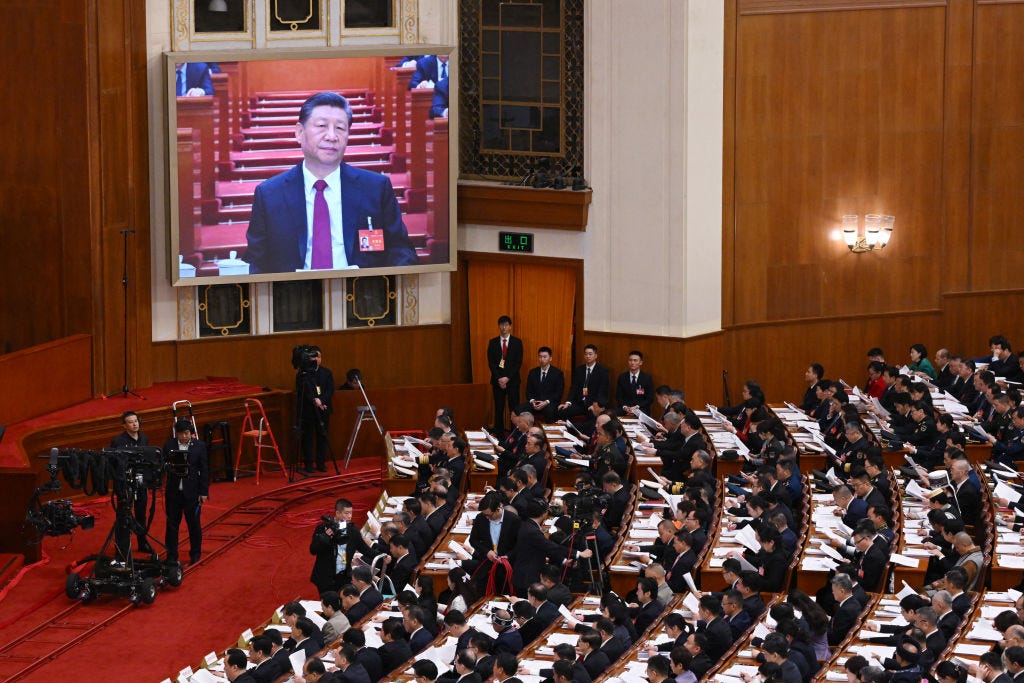- Under Xi Jinping's rule, China's economy has slowed after decades of growth.
- This week, Xi decided to cancel an annual press conference with Premier Li Qiang.
- Analysts believe this was an attempt by Xi to avoid revealing the depth of China's troubles.
In the opaque world of Chinese politics, subtle signals can reveal important shifts in mood.
One of those signals emerged this week when, in a surprise move, China's leader Xi Jinping decided to cancel an annual press conference with Premier Li Qiang.
The press conference was meant to be held during the "Two Sessions" summit, where officials from across China gather to project an image of the unity and strength of the ruling Communist Party.
It has been held for three decades and is one of the few occasions where top officials are subjected to media questions.
But, it seems, Xi doesn't want the scrutiny.
And he has good reason. After decades of growth, China's economy is slowing, with a property market crisis causing consumer debt, deflation, a slowdown in spending, and an unemployment crisis.
His growing paranoia may also have played a part. In recent months, foreign policy and defense officials have disappeared as Xi consolidates power. It now appears he has relegated the premier to a less visible role, according to The New York Times.
Jonathan Ward, Senior Fellow at the Hudson Institute and author of "The Decisive Decade," said the cancellation reflected the Party's increasing unwillingness to deal with "meaningful questions about China's future and overall direction."
"The important questions about China's direction and future are the ones that place the Chinese Communist Party in the worst light," said Ward.
Xi and his deputies are also facing increasing pressure to address the finances of Chinese households, intensifying domestic repression, and China's backing for Russian and Iranian aggression.
Ward said that "unscripted encounters with journalists on any of these subjects would accentuate the depth of China's present troubles and its coming rift with the Western world."
Ali Wyne, a senior researcher at the International Crisis Group, said that the cancellation reflected the urgency of Xi's desire to control the narrative while facing a range of serious challenges.
"The decision suggests that Xi Jinping is further attempting to consolidate his political authority and, at a time of growing external concern over the state of China's economy, shape the narrative that Beijing puts forward about its internal health," he said.
Xi walks a tightrope
As well as moves to close down scrutiny, the Party is unveiling ambitious measures to boost China's economy. Li said Tuesday that China was aiming for 5% annual growth and announced that the government would introduce jobs programs, tighter financial market regulation, and investment in AI.
But analysts say China continues to face deep economic problems.
China's growth target, which is in line with last year's official growth figures, appears modest in comparison to the 10% annual growth it has experienced on average for the past few decades.
Economists told the BBC that they're wary of China's 5% claim. They believe that the real growth rate last year was likely closer to 1-2%.
China's economic woes come as it intensifies its bid to challenge the US as a global power by providing crucial economic and diplomatic support to Vladimir Putin's Russia in its invasion of Ukraine and Iran in the Middle East.
Such moves are driving a rift between China and the West, even as China remains reliant on Europe's economy.
Critics say Xi is walking a tightrope. Attempts to suppress critics and aggressive policies to enhance China's global power are scaring away foreign investors, they say, while China remains badly in need of foreign cash to boost growth.
These challenges have led Xi to intensify his repression of domestic dissent and tighten his grip on power, recently purging the military and government of top officials.
And Xi's authoritarian instincts will likely continue to guide his response to China's many challenges, said Ward.
"As China's internal difficulties mount – and as its aggressive foreign policy goes global with the Party's support of its partners in Moscow and Tehran – we should expect that Xi and his loyalists will do whatever they can to ensure that they are unchallenged at home," he said.

